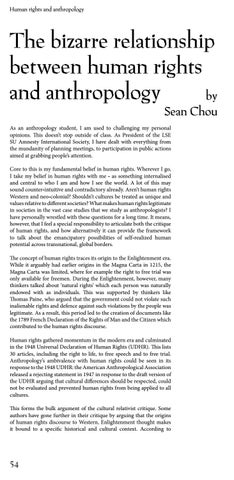Human rights and anthropology
The bizarre relationship between human rights and anthropology by Sean Chou As an anthropology student, I am used to challenging my personal opinions. This doesn’t stop outside of class. As President of the LSE SU Amnesty International Society, I have dealt with everything from the mundanity of planning meetings, to participation in public actions aimed at grabbing people’s attention. Core to this is my fundamental belief in human rights. Wherever I go, I take my belief in human rights with me - as something internalised and central to who I am and how I see the world. A lot of this may sound counter-intuitive and contradictory already. Aren’t human rights Western and neo-colonial? Shouldn’t cultures be treated as unique and values relative to different societies? What makes human rights legitimate in societies in the vast case studies that we study as anthropologists? I have personally wrestled with these questions for a long time. It means, however, that I feel a special responsibility to articulate both the critique of human rights, and how alternatively it can provide the framework to talk about the emancipatory possibilities of self-realized human potential across transnational, global borders. The concept of human rights traces its origin to the Enlightenment era. While it arguably had earlier origins in the Magna Carta in 1215, the Magna Carta was limited, where for example the right to free trial was only available for freemen. During the Enlightenment, however, many thinkers talked about ‘natural rights’ which each person was naturally endowed with as individuals. This was supported by thinkers like Thomas Paine, who argued that the government could not violate such inalienable rights and defence against such violations by the people was legitimate. As a result, this period led to the creation of documents like the 1789 French Declaration of the Rights of Man and the Citizen which contributed to the human rights discourse. Human rights gathered momentum in the modern era and culminated in the 1948 Universal Declaration of Human Rights (UDHR). This lists 30 articles, including the right to life, to free speech and to free trial. Anthropology’s ambivalence with human rights could be seen in its response to the 1948 UDHR: the American Anthropological Association released a rejecting statement in 1947 in response to the draft version of the UDHR arguing that cultural differences should be respected, could not be evaluated and prevented human rights from being applied to all cultures. This forms the bulk argument of the cultural relativist critique. Some authors have gone further in their critique by arguing that the origins of human rights discourse to Western, Enlightenment thought makes it bound to a specific historical and cultural context. According to
54
